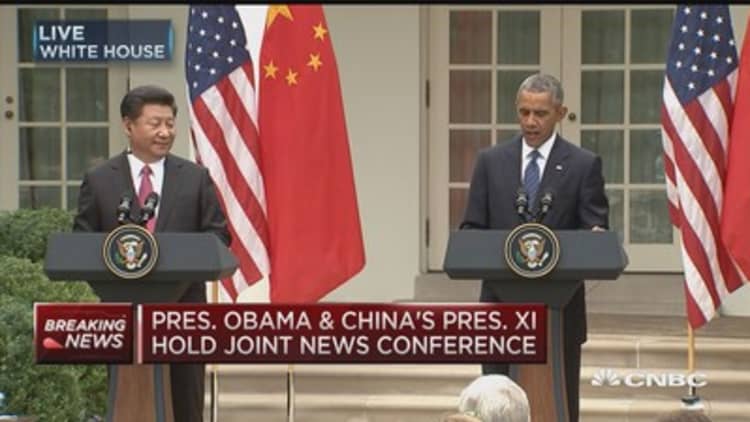US officials have declared what amounts to a truce in their campaign over China's Asian infrastructure bank, claiming they have secured commitments from Beijing to address Washington's concerns as well as a "meaningfully increase" its financial contributions to the World Bank and other potential regional rivals to the new institution.
The US has declined to join the Asian Infrastructure Investment Bank and been leading what many allies and others see as a failed campaign against it.
Together with the New Development Bank being founded with other Brics economies, the AIIB represents perhaps the biggest challenge yet mounted to the Bretton Woods international financial architecture established in 1944.
The latest move highlights how eager US president Barack Obama and his administration are to put that chapter of their engagement with China behind them and resume normal relations on international economics.
During last week's state visit by Xi Jinping, the Chinese president, the Obama administration also reiterated its pledge to back China's bid for the inclusion of its currency, the renminbi, in an elite International Monetary Fund basket of reserve currencies as long as Beijing is declared worthy by the IMF.

Senior administration officials said that during Mr Xi's visit, Washington had secured a pledge from Beijing to increase its financial contributions to the World Bank and regional development banks.
The first step, they said, would be an increase in China's contribution to the International Development Association, the World Bank's main concessional lending facility for its poorest client countries and similar ones at regional development banks.
China had also made a commitment that the AIIB, and any other new and future institutions it was involved in, would abide by the highest international environmental and governance standards, addressing what the US and campaign groups have said is one of its concerns about the new bank.
More from the Financial Times:
China and US to co-operate on anti-graft
AIIB launch signals China's new ambition
Road map needed for Asia infrastructure
"We feel that is extremely positive," said one senior administration official. "That is a breakthrough."
The commitments were laid out, albeit in vague terms, in a joint "fact sheet" about the two countries' economic discussions during Mr Xi's two-day visit to Washington.
In it, the two countries reaffirmed their commitment to existing international financial institutions and pledged to "further strengthen the World Bank" as well as regional banks in Asia, Africa and Latin America. "China intends to meaningfully increase its role as a donor in all these institutions," the joint statement said.
"Both sides acknowledge that for new and future institutions to be significant contributors to the international financial architecture, these institutions, like the existing international financial institutions, are to be operated … with the existing high environmental and governance standards," it said.
That both sides are keen to put the AIIB dispute and any conflict over the governance of the existing institutions behind them was also evident in Mr Xi's public statements during his visit.
Read MoreUS-China agree to not conduct cybertheft of intellectualproperty
At a press conference with Mr Obama on Friday, the Chinese president said the US and China had agreed to step up their co-operation in areas such as the G20, World Bank and IMF.
"China is the current international system's builder, contributor and developer and participant, and also beneficiary," he said. "We are willing to work with all other countries to firmly defend the fruits of victory of the second world war, and the existing international system."
He also defended the establishment of the AIIB and Beijing's "One Belt One Road" plan to build a new Silk Road to Europe, which many experts see as a potential strategic rival to the US-led 12-country Trans-Pacific Partnership.
"These initiatives are open, transparent, inclusive," he said. "And we welcome the US and other parties to actively participate in them."

